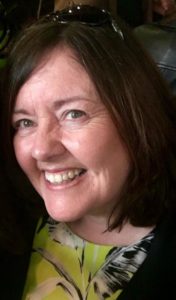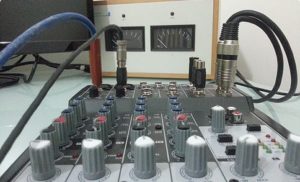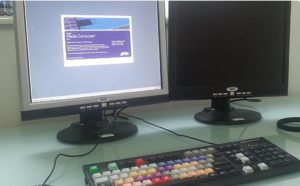Creative Process Series – Part Three
June Wood is a BAFTA award-winning freelance Editor with a track record of enabling directors and producers to turn their creative vision into on-screen reality. Utilising her 30 years’ experience from ITV, she exploits raw footage to provide an engaging narrative. She has recently been working on Channel 4’s The Lie Detective with the polygraph expert, Dan Ribacoff and her work on documentary Deconstructing Zoe was selected for the Seattle Transgender Film Festival.
 Editing a video is ultimately all about building a story out of raw material. It’s your job to identify the beginning, middle and end, and working out the best way to transition from each section. Creating a perfect whole by adding flow and emotion to engage the target audience that holds their attention should be your end goal.
Editing a video is ultimately all about building a story out of raw material. It’s your job to identify the beginning, middle and end, and working out the best way to transition from each section. Creating a perfect whole by adding flow and emotion to engage the target audience that holds their attention should be your end goal.
First and foremost, before getting to the nitty gritty of cutting the footage, it’s crucial to figure out what your message is. What is the point of the video you’re creating? What is the story? Once you’ve established this, you’ll then be able to figure out where the video should begin, how it should end, and the route to get from the one to the other.
Communication with your producer throughout the whole process from the rough edit to the final work only makes for a better finished product. Examine both the big picture and the fine details. Pointing out weaknesses and suggesting alternative options can be a useful way to strengthen any areas that need tweaking.
As an editor, whether you are working in broadcast, events, corporate or music, there is a technical side to cutting a video and an opportunity to be creative to ensure the story you tell is compelling enough to entertain the audience.
When starting out in the industry, the challenge of telling a truly engaging story can be a daunting one, but many of the technical and creative skills needed to achieve this goal will come with time throughout your career. To truly succeed as an editor, there are three key skills I think are essential to have from the get-go:
1. Organisation, organisation, organisation
This all starts with the creation and upkeep of your media management including workflows whether you are working on single, multiple or shared storage systems.
For a freelance editor, when you join a post production house, there are generally workflows and deliverables already in place. This means you must quickly get to grips with their processes. It is also important to keep your work as tidy as possible. Some projects can generate hours and hours worth of footage which all has to be uniquely identifiable by all users to deliver your cut and/or revisions.
An editor also needs to pay close attention to detail and have the ability to meet tight deadlines. Having the foresight to recognise costly pitfalls before they happen is a great skill to develop, along with keeping a clear idea of the storyline, even though you may be editing scenes out of sequence.

2. Have a little patience and stay calm
I have worked in a whole host of TV newsrooms, from regional to global. They all have one thing in common; journalists running from edit suite to edit suite needing to cut the latest breaking news – and it needs to be cut now.
If the editors were half as tightly sprung as the journalists they’re about to work with, nothing would get done.
As an editor, if you come across as calm and patient, this will trickle through to your journalist/producer. It keeps you in control of the edit so you can focus on all aspects of the story, from recording the voiceover to finding and editing the material.
By remaining patient while recording the voiceover again and again with the clock ticking and the news editor shouting at the top his voice, maintaining a calm exterior has always gotten me through. By keeping my concentration, I am able to produce accurate and moving edits on time with a journalist that trusts me to deliver.
Long projects also require plenty of patience from the editor. You will also need to be flexible and work at short notice if necessary. Don’t be surprised to also find yourself working much longer hours to meet project deadlines.
3. Open your mind
Keeping an open mind goes hand in hand with the creative process. On occasion, you will have your own ideas of how a certain scene or section can be cut together. The whole process of story-making evolves from development of the project from cameras to director to producer and finally editor. It is a collaboration. Never dismiss an idea without actually trying it. This also develops your personal skills, as it is always beneficial if an editor is a good listener. And never forget the cardinal rule; what is discussed in the edit suite, remains in the edit suite!
 Editors are notorious for being opinionated and determined because we’re perfectionists! We often have a great eye for detail, a love of storytelling and strong current film knowledge. Editors never stop learning and enjoy working with and playing with pictures and sound.
Editors are notorious for being opinionated and determined because we’re perfectionists! We often have a great eye for detail, a love of storytelling and strong current film knowledge. Editors never stop learning and enjoy working with and playing with pictures and sound.
In the words of Thelma Schoonmaker, who has edited all of Martin Scorsese ‘s films since Raging Bull “…there are a lot of egos in film-making and you have to learn to work together in spite of them.”
This series will continue every day this week; tomorrow we hear from media composer, Barrie Gledden.
June Wood is one of our talented editors – to view other editor showreels, head to our gallery.
Audio Network is an independent music company delivering authentic and creative music solutions to global content creators in every industry. Their production music library has over 120,500 high quality stock music tracks for TV, film, advertising and corporate video.


